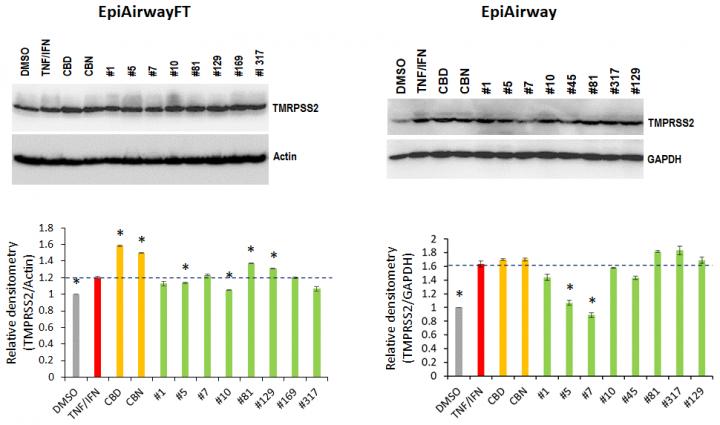‘The Aging-US authors developed over 800 new C. sativa cultivars and hypothesized that high-CBD C. sativa extracts may be used to down-regulate ACE2 expression in target COVID-19 tissues’

Credit: Correspondence to: Olga Kovalchuk email: [email protected] and Igor Kovalchuk email: [email protected]
Aging-US published “In search of preventive strategies: novel high-CBD Cannabis sativa extracts modulate ACE2 expression in COVID-19 gateway tissues” which reported that Cannabis sativa, especially those high in the anti-inflammatory cannabinoid cannabidiol, has been found to alter gene expression and inflammation and harbour anti-cancer and anti-inflammatory properties.
Working under a Health Canada research license, the Aging-US authors developed over 800 new C. sativa cultivars and hypothesized that high-CBD C. sativa extracts may be used to down-regulate ACE2 expression in target COVID-19 tissues.
Using artificial 3D human models of oral, airway and intestinal tissues, they identified 13 high-CBD C. sativa extracts that decrease ACE2 protein levels.
Some C. sativa extracts down-regulate serine protease TMPRSS2, another critical protein required for SARS-CoV-2 entry into host cells.
While their most effective extracts require further large-scale validation, their study is important for future analyses of the effects of medical cannabis on COVID-19. The extracts of their most successful novel high-CBD C. sativa lines, pending further investigation, may become a useful and safe addition to the prevention/treatment of COVID-19 as an adjunct therapy.
Dr. Olga Kovalchuk and Dr. Igor Kovalchuk said, “There is a global pandemic of the COVID-19 disease, which is caused by the zoonotic severe acute respiratory syndrome coronavirus 2 (SARS-CoV-2).”
Similar to other respiratory pathogens, SARS-CoV-2 is transmitted through respiratory droplets from coughing and sneezing. However, aerosol transmission and close-contact transmission cannot be ruled out as means of disease spread.
An in-depth analysis of The Cancer Genome Atlas and Functional Annotation of The Mammalian Genome Cap Analysis of Gene Expression datasets revealed that ACE2 is expressed in oral mucosa and enriched in the epithelial cells of the tongue.
High levels of ACE2 expression in oral epithelial tissues suggests that the oral cavity could be highly susceptible to SARS-CoV-2 infection and thus an important target for prevention strategies.
Similarly, numerous studies have reported high levels of ACE2 in the lower respiratory tract; higher levels of ACE2 expression, such as those seen in smokers and patients with chronic obstructive pulmonary disease, are associated with higher COVID-19 predisposition and enhanced disease severity.
Using artificial 3D human tissue models, the authors show that high-CBD C. sativa extracts may down-regulate ACE2 expression in target COVID-19 tissues, suggesting an importance of these extracts in COVID-19 prevention.
The Kovalchuk/Kovalchuk Research Team concluded in their Aging-US Research Output, “While our most efficacious extracts require further validation through large-scale analyses, our study is important for future analyses of the effects of medical cannabis on COVID-19. Given the current dire and rapidly developing epidemiological situation, every possible therapeutic opportunity needs to be considered and researched.”
###
Sign up for free Altmetric alerts about this article
DOI – https:/
Full Text – https:/
Correspondence to: Olga Kovalchuk email: [email protected] and Igor Kovalchuk email: [email protected]
Keywords: COVID-19, SARS-CoV2, ACE2 receptor, medical cannabis, CBD
About Aging-US
Launched in 2009, Aging-US publishes papers of general interest and biological significance in all fields of aging research as well as topics beyond traditional gerontology, including, but not limited to, cellular and molecular biology, human age-related diseases, pathology in model organisms, cancer, signal transduction pathways (e.g., p53, sirtuins, and PI-3K/AKT/mTOR among others), and approaches to modulating these signaling pathways.
To learn more about Aging-US, please visit http://www.
Aging-US is published by Impact Journals, LLC please visit http://www.
Media Contact
18009220957×105
[email protected]
Media Contact
Ryan James Jessup
[email protected]
Original Source
https:/
Related Journal Article
http://dx.




